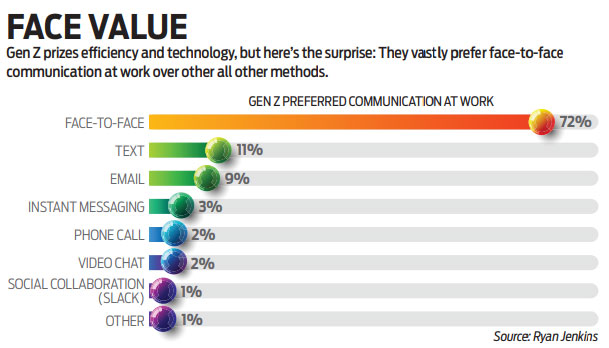Strategy October 07, 2019
Generation Z Poised To Enter Your Sales Ranks
Are you ready?
At a recent keynote address to business executives, generations expert Jonah Stillman asked the audience to shout out one word to describe millennials. The choices were predictable:
“Entitled!”
“Lazy!”
“Self-centered!”
After the group catharsis, Stillman made this point: Whatever your opinion on millennials – unfairly maligned or insufferable brats – it matters less now. Millennials (born between 1980 and 1994) are in management and they’re making major buying decisions. They’re the largest generation in the U.S. workforce, and they’re well-entrenched.
Stillman urged the attendees to shift their focus, because there’s another group knocking on the office doors and poised to enter: Generation Z.
Born between 1995 and 2012, Gen Z comprises 30% of the world’s population, making them the largest generation, according to Bloomberg. The oldest of this group are 23 and 24, recent college graduates looking to embark on their careers. Yes, they’re tech-savvy, creatively minded and naturally inquisitive. One thing they’re not? Millennials.
“The older generations lump everyone under 30 into one entitled generation,” says Stillman, the co-author of Gen Z @ Work: How the Next Generation Is Transforming the Workplace. Stillman should know – he’s 20 years old. That makes him the resident expert at GenZGuru, the consulting company he leads with his dad David, also a generations expert. Clients include Carnival Cruise Line, Microsoft and the NFL.
By phone in a quiet office on a beautiful summer Friday (the rest of GenZGuru’s staff had taken off), Stillman explains what sets his generation apart. “Gen Z is its own,” he continues. “Honestly, we’re more like boomers than millennials. We’re skeptical and competitive while millennials tend to be more collaborative. Meanwhile, managers are trying to figure all this out. But no one is better or worse. We’re just different.”
We saw huge companies crumble. We had different dinner table conversations from millennials.Jonah Stillman, GenZGuru
The origin of most generational differences can be found by examining the large-scale factors that shape each generation’s outlook on the world and their place in it. For Gen Z, these include digital innovation, 24/7 exposure to global events, constant flux and the 2008 economic crash. It’s an interesting mix of far-seeing vision and guarded cynicism, and like each generation before them, the members of Generation Z will shape the companies they join just as much as the working world will shape them.
“Gen Z’s creativity and fresh perspective are highly valuable to organizations,” says Ryan Jenkins, a speaker, author and generations expert. “They’re unaware of the walls that many industries enclosed themselves into for decades.”
Take technology, for instance. Ask anyone to create a mental picture of a group of Gen Zers; inevitably, the people in that image will be looking down at a smartphone. While their attachment to their mobile devices is often lamented by older generations, it can be a good thing.
“People say it’s a negative that we’re so tech-savvy, but it’s actually a positive,” says Lily Schneider, a senior at Wake Forest University in North Carolina who spent this past summer as an intern at Top 40 distributor Axis Promotions (asi/128263) in New York City. “We’re comfortable with both video conferencing and face-to-face conversations, for example. The digital skills make us more independent and resourceful. We have a willingness to learn and a natural curiosity.”
Pressed by technology changes and the waves of millennials joining their ranks, many distributors have remodeled every touchpoint they have with their reps – from digital tools to greater hands-on training to shifting pay models. Now, as they’re confronted with the next generation of sales reps, distributors must double down on those investments while accounting for the individual aspects that set Gen Z apart – or risk falling further behind.
“Gen Z needs companies to create a culture of listening where ideas are welcome, there’s openness to challenges to the status quo and they’re empowered to champion what makes their company better than the competition,” says Jenkins. “They’re an organization’s ticket to a better future.”
On June 29, 2007, Apple released the first version of its now-ubiquitous iPhone. The oldest members of “iGen” were turning 12, so they spent their formative years with smartphones – and thus, the world – in their hands. They’ve changed how we interact with each other and the world, and the devices have had a formative impact on the members of Gen Z, 98% of which own one. The average age they currently receive a smartphone? Twelve years old.
They’re the first digitally native generation, says Stillman, meaning they were born after widespread adoption of this current technology. “Gen X lobbied for internet access at their workplaces, and they commercialized it,” he says. “Millennials pioneered social media. Gen Z’s comfort with tech is unrivaled. We’re constantly looking at ways to make things more efficient. It’s not just second nature; it’s part of who we are.”
Gen Z expert Jonah Stillman discusses the forces that have shaped his generation and the value Gen Z brings to the workplace.
And that’s shifting how they demonstrate their value in the workplace. Britney Godsey, vice president of sales at Top 40 supplier Gold Bond (asi/57653), says there’s a long-held but outdated belief that the amount of manual labor an employee does determines their value. “Gen Z can figure out a way to do something in one step when it used to take 20,” she says. “They’re interested in finding different ways of doing things.”
Of course, there are those who believe that Gen Z’s integration with technology means they have no people-to-people social skills. That’s not entirely true.
GenZGuru commissioned a study that asked Gen Z about their preferred method of communication with others; 84% chose “face-to-face.” They’re looking for authenticity, says Stillman, which is easier to discern when looking someone in the eye. But face-to-face doesn’t mean five feet from each other; now it includes FaceTime, Skype and Google Hangouts.
They’re also doing less cold-calling from their desk between 9 and 5 and then leaving it all behind at the end of the day, says Kate Alavez, COO of Top 40 distributor PromoShop (asi/300446). “That line between work and home has been erased,” she says. “They’re now as close to their buyers as their friends, and that’s going to shift this industry.”
They can work quickly for clients, an important attribute in the time-sensitive promo realm. They have no problem quickly texting order status updates, or sourcing product on the go. “They don’t go anywhere without their phones,” says Larry Cohen, CEO of Axis, “and that’s great for sales and client relations.”
Meanwhile, as Gen Z grew up with technology, they also came of age in a post-Great Recession reality. The shockwaves of that downturn in September 2008 were felt around the entire world, and many members of Gen Z, in their pre-teen and early teen years at the time, were personally affected by it.
Gen Z can figure out a way to do something in one step when it used to take 20. They’re interested in finding different ways of doing things.Britney Godsey, Gold Bond
“Their parents worked at one place for 20 or 30 years,” says Alavez. “They were loyal, they never took a vacation or sick day, and then they were laid off. Gen Z saw that, and they’re skeptical of companies; they want a work/life balance and they want to be their own bosses. Everyone has a side hustle.”
Stillman says the recession conditioned Gen Z to expect instability and flux, and to prepare accordingly. “We saw huge companies crumble,” he says. “We had different dinner table conversations from millennials, who were formed in the 1990s during the tech boom, when companies that started in garages became empires in like eight months. Our world is scarier, so we’re more realistic.”
Morgan Brooks, who spent this past summer as a sales & marketing intern at Top 40 distributor Jack Nadel International (JNI, asi/279600) and is now a junior at Loyola Marymount University, says her family was impacted directly by the recession. “It was a very scary time for us,” she says. “We want companies to invest in us and offer us some security.”
To attract Gen Z hires, meet them where they are. While they spend a lot of time on social media, their job search toolbox is bigger than that.
A recent study by the Center for Generational Kinetics found that, while millennials trust digital sites most for job postings, Gen Z tends to look to flesh-and-blood people first: 60% of Gen Zers are likely to ask friends or family about openings, and 57% will ask someone who already works at the company they’re interested in.
To broaden its appeal to Gen Z, Vantage Apparel (asi/93390) has a consistent presence on job websites, at recruiting fairs and with business, marketing and fashion merchandising departments at nearby universities. “Placement is more sustainable when professors make the connection with one-on-one reach-outs,” says Rob Watson, the company’s chief digital officer.
In fact, Brooks found her summer internship at JNI through her accounting professor this past year, and Schneider heard about Axis from a close friend’s father. The latter says she went to the company’s website and social media to find out more. According to the Center for Generational Kinetics, 41% of Gen Z uses YouTube to perform research on a company, followed by Instagram (37%) and Facebook (36%).
Once they find a position that fits their interests, what compels Gen Z to take the next step and apply? Nikki Winn, a marketing specialist at JNI who graduated last year from Pepperdine University and started at the company as an intern (a position she also heard about through word-of-mouth) says she wanted to work somewhere that was innovation-focused. “They need to be moving forward, especially with technology,” she says. “If they don’t have social media or a system for internal communication, that’s a no-go.”
Gen Z also wants more guaranteed compensation, as opposed to being commissioned salespeople. “We’re not really into 100% commission,” says Schneider, the recent intern for Axis. “We value stability, and for us, a paycheck isn’t everything.”
They’re also looking for a deeper purpose in their jobs. When Anna Cao, customer experience liaison at Doing Good Works (asi/222095), first interviewed at the company, which supports fostered youth across the country, she was pleasantly surprised by how much they wanted to know about her experiences and values, rather than just the bottom line.
“They genuinely wanted to get to know me, professionally and personally,” she says. “I was asked about my upbringing, support systems and passions. They analyzed my resume and asked about my experience, and how they could help me in my career. As part of my job, I also speak with customers about how their purchase will help fostered youth. That’s the cherry on top.”
In addition, time flexibility, telecommuting, medical benefits and a fun office space are all at the top of Gen Z’s expectations list. “We want to know companies care about our wellbeing as individuals,” says Winn. “And we spend so many hours here, we want it to feel like home.”
And if a company isn’t sustainability- or diversity-minded, management will hear about it. No recycling bins? Office lights left on 24/7? Gen Z will notice it and bring it up. “We’ll call companies out,” says Stillman. “And we can’t believe there are still diversity departments. It’s almost 2020; a diverse workforce should be a given.”
They’re passionate and purposeful, says Alavez, and that now includes their work life. No longer is work just about getting paid and going home. Now, Gen Z wants meaning and work/life balance at a company that’s purpose-driven and socially responsible. “The world is bigger than our desks,” she says. “We’re so tied to the impact of things.”
Once a company has made the decision to welcome a Gen Z employee aboard, the first few weeks and months of onboarding are crucial. It’s imperative that training programs cater to their expectations and learning style. For example, Gold Bond now offers more dashboards, videos and real-time accessibility to relevant information.
“They don’t want to fill out a ton of forms,” says Godsey. “They shadow on the jobs they’ll be doing, and we send them out on the road with different reps so they can ask questions.”
New hires at Vantage go through two weeks of intensive training – they learn about the industry, spend time in production and attend an industry trade show if possible, says Watson. They’re then asked to report back on how the training met their expectations, and the feedback is used to make changes and improvements.
We want companies to listen to our ideas and not just pick from the top.Morgan Brooks, Jack Nadel International
One valuable Gen Z tip: Schneider says hands-on, autonomous training is far more effective than forced wading through lengthy manuals. “I’ve learned a lot through actual projects I’ve been assigned,” she says. “Real-life examples work, not reading a handbook.”
Another piece of advice: Avoid long hours in classroom formats, says Stillman. Google’s recent Gen Z study found that 71% spend three or more hours a day watching videos online. They’re so accustomed to heading to YouTube to find out what they need to know that the traditional instructional setting will turn them off. Instead, put them into their actual job on the first day and provide digital resources they can reference when they need them.

“That’s ‘just in time’ learning, versus ‘just in case’ learning in the classroom, where we might use a fraction of what we learn and the rest never comes up,” he explains. “We’re independent learners.”
Gen Z is generally inquisitive, says Alavez, and companies need to welcome that. “It’s no longer, ‘Here’s your employment packet, now go to your desk,’” she says. “They’re not afraid to ask why things aren’t done differently. They see opportunities for change.”
Stillman recommends that as Gen Z learns the ropes, employers should welcome their input. Avoid alienating them by shutting down their ideas with a swift refusal to hear them out. If the idea won’t work, it’s OK to say so. But Gen Z wants a thoughtful explanation.
“We want them to listen to our ideas and not just pick from the top,” says Brooks. “To be heard is awesome, and for management to know my name makes all the difference. You want to work that much harder.”
And while Gen Z appreciates autonomy and little micromanaging, they still look for regular interactions with their supervisors so they know their company cares about how they’re doing. Axis actually increased the number of check-ins with new hires. “We talk more about culture, not just technical things,” Cohen says. “They should feel like a part of the team and see how they fit into the environment here.”
As Gen Z settles in, they might find their interests lie in a particular area that’s different from the job they were originally hired for. Accommodate that as much as possible, says Alavez. “We need to give them the opportunity to move forward and benefit from mentorships,” she says. “We should always be dialoguing with them. They’re high-tech and high-touch.”
As they start hitting their stride, Gen Z still wants clear meaning, autonomy, flexibility and a listening ear. Just because official training has concluded doesn’t mean companies can ignore them. They need to be continuously reminded of the value they bring to their roles.
Importantly, they also want to be treated like responsible adults, not entitled newbies. “We don’t treat them like they need to be corralled,” says Cohen.
That also means companies need to understand Gen Z’s desire to strike an optimal work/life balance. After 2008, they saw what happened to parents and relatives who did the job they were tasked with and stayed put. They were told to clean out their desks as their jobs disappeared and retirement funds dried up.
“We’re OK with taking vacations and bettering ourselves,” says Brooks. “We’re called ‘lazy’ because we want balance, but we’re making work more fun.”
They’re also used to customizing everything to their individual tastes – from social feeds to Netflix lists – and their careers are no different. They’re laser-focused on advancement and direction, perhaps influenced by the fact that few have ever driven without Google Maps.
Show them how to be deliberate and patient, and “provide opportunities for them to gain small wins and achieve certain goals,” says Watson.
But beware: If expectations aren’t met, they’ll look elsewhere. ThriveMap, a pre-hire assessment firm, found that 73% of Gen Z left a job because it didn’t meet expectations. “Development opportunities and work with meaning used to be ‘nice-to-haves’,” says generational expert Jenkins. “If a company doesn’t provide them now, Gen Zers are a finger swipe away from finding one that does.”
It’s a fine line that employers have to walk: meeting expectations while expecting them to truly earn their promotions. But Gen Z is fine with that.
“Advancement should be based on performance, not just seniority,” says Stillman. “Employers will be pleasantly surprised by our willingness to work hard.”
Sara Lavenduski is the senior editor for Advantages. Tweet: @SaraLav_ASI. Contact: slavenduski@asicentral.com



